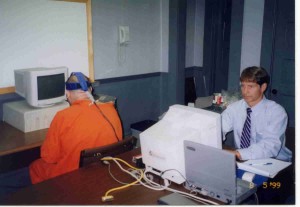Technological Jargon you say, but read on to learn about possibilities that exist in this life.
Brain Fingerprinting is a controversial forensic science technique that uses Electroencephalography (EEG) to determine whether specific information is stored in a subject’s brain. It does this by measuring electrical brainwave responses to words, phrases, or pictures that are presented on a computer screen. Ok so how did I come about this subject? I was reading a book about human behavior and how to determine if people really are who they say they are. That was when the word came up. So I dug further.
The person to be tested wears a special headband with electronic sensors that measure the EEG from several locations on the scalp. The subject views stimuli consisting of words, phrases, or pictures presented on a computer screen. Stimuli are of three types:
- “Irrelevant” stimuli that are irrelevant to the investigated situation and to the test subject,
- “Target” stimuli that are relevant to the investigated situation and are known to the subject, and
- “Probe” stimuli that are relevant to the investigated situation and that the subject denies knowing.
Probes contain information that is known only to the perpetrator and investigators and not to the general public or to an innocent suspect who was not at the scene of the crime. Before the test, the scientist identifies the targets to the subject, and makes sure that he/she knows these relevant stimuli. The scientist also makes sure that the subject does not know the probes for any reason unrelated to the crime, and that the subject denies knowing the probes. The subject is told why the probes are significant (e.g., “You will see several items, one of which is the murder weapon”), but is not told which items are the probes and which are irrelevant.
By comparing the responses to the different types of stimuli, the brain fingerprinting system mathematically computes a determination of “information present” (the subject knows the crime-relevant information contained in the probe stimuli) or “information absent” (the subject does not know the information) and a statistical confidence for the determination. This determination is mathematically computed, and does not involve the subjective judgment of the scientist.
Practical Uses
Brain fingerprinting has been applied in a number of high-profile criminal cases, including helping to catch serial killer JB Grinder (Dalbey 1999) and to exonerate innocent convict Terry Harrington after he had been falsely convicted of murder (Harrington v. State). Although highly criticized on a number of fronts, Brain fingerprinting has been ruled admissible in court.
Application in Nigeria?
Brain Fingerprinting has two primary applications:
1) detecting the record of a specific crime, terrorist act, or incident stored in the brain, and
2) detecting a specific type of knowledge, expertise, or training, such as knowledge specific to security service (SSS), terrorists, or bomb makers
To apply this technology in Nigeria will be fun (and useful). There are so many issues where Brain fingerprinting could come in handy. The federal security committee on Boko Haram will surely find this useful. I am sure that in the area of law, especially pertaining to politics, we will find it useful.
I wonder what other applications there could be in Nigeria. I know there are problems this technology could solve for Nigeria – serving as a ‘lie detector’ in great country as ours.
Comments please.












Recent Comments